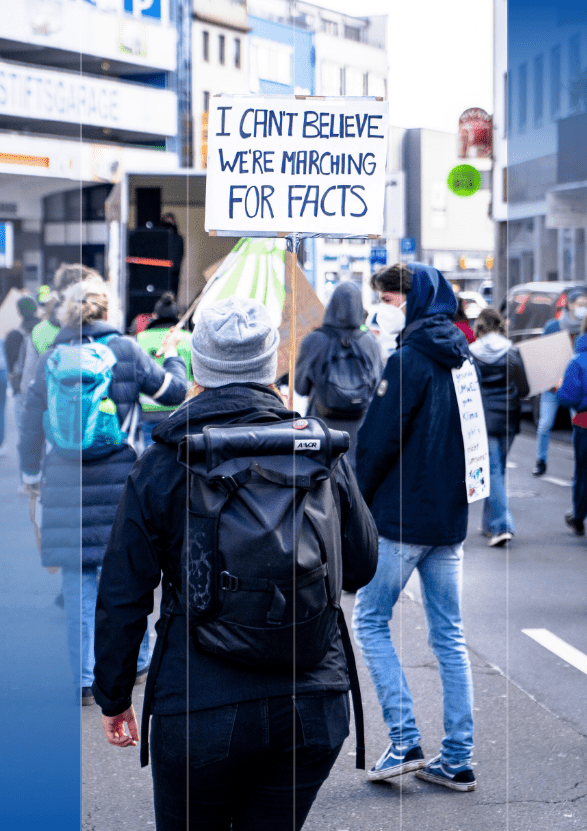

New Study Reveals the Pervasiveness of Conspiracy Mentality in Times of Crises
Dr. Kai Unzicker
In the realm of disinformation, new pathways and various forms continue to emerge, with conspiracy narratives being a common variant. These narratives create the impression that hidden powers are orchestrating events from behind the scenes. To truly comprehend why disinformation spreads so effectively and garners widespread belief, it becomes crucial to delve deeper into the realm of conspiracy narratives. This is precisely what our recent study aimed to accomplish. Rather than focusing on specific concrete conspiracies, we explored the underlying disposition that inclines individuals towards believing in conspiracies, commonly known as the “conspiracy mentality.”
The Widespread Prevalence of Conspiracy Mentality
Through a survey encompassing over 2,700 participants aged 16 and above in Baden-Württemberg, our findings revealed the widespread prevalence of conspiracy mentality. More than half of the respondents firmly believed that the public remains uninformed about numerous matters or that politicians frequently conceal their true motives. Additionally, one-third of the respondents subscribed to the notion that secret organizations exert significant influence over political decisions. Overall, our analysis indicated that 19 percent of the participants exhibited a pronounced conspiracy mentality. However, it is important to note that this does not necessarily imply that these individuals consistently advocate for or believe in specific conspiracy narratives. Instead, the conspiracy mentality illustrates their inherent susceptibility to such myths and narratives. Conversely, only one-third of the population seems to possess immunity against conspiracy narratives and displays minimal evidence of this mentality.
Disinformation Finds Fertile Ground in Existing Conspiracy Mentality
When individuals firmly believe in the existence of clandestine plans beneath the visible public sphere and harbour mistrust towards politicians, these beliefs serve as fertile ground for disinformation. Such narratives often validate latent convictions and embellish them with new stories that align with the current political climate. Hence, it is hardly surprising that these narratives reappear in updated guises over decades, and sometimes even centuries.
Uncertainty and Lower Education Amplify the Propensity for Conspiracy Mentalities
Pessimism regarding the future, feelings of insecurity, and lower levels of formal education contribute to an increased inclination towards conspiracy mentality. Additionally, individuals who perceive their economic status as threatened or believe that their own needs are insufficiently addressed in politics are more likely to subscribe to conspiracy narratives. Consequently, conspiracy narratives gain popularity during times of economic and political crises, making disinformation particularly potent. Conversely, those who are more integrated into society exhibit lower levels of conspiracy mentality, indicating that individuals with extensive social networks, strong bonds, and greater engagement are less susceptible to such beliefs.
The Need for Counter Speech against Conspiracy Narratives
Social cohesion has suffered, particularly among those who lack immunity to conspiracy narratives. The adverse effects of conspiracy narratives likely proliferate in environments with limited dissent and social correction. Maintaining stable coexistence in society necessitates a critical mass of individuals who actively challenge and debunk conspiracy narratives or, at the very least, publicly advocate for reasonable and rational positions.
Countering Disinformation and Reducing Susceptibility to Conspiracy Narratives
The study demonstrates the vital importance, especially during times of crises, of both curbing the spread of disinformation and ensuring that conspiracy narratives no longer find easy acceptance. Achieving this requires bolstering security and stability among citizens since heightened insecurity increases the likelihood of conspiracy narratives gaining traction. Equally important is minimising the number of individuals who lack social relationships that can serve as a corrective influence and an anchor. Those who feel included and supported exhibit greater resilience. Lastly, imparting essential skills to distinguish truth from falsehoods becomes imperative, particularly in confusing times when a deluge of information from numerous sources inundates everyone.
The study “Conspiracy Mentality in Times of Crises” by Georgi Dragolov, Klaus Boehnke, and Kai Unzicker is a detailed analysis of data from an online survey of approximately 2,700 individuals aged 16 and older in Baden-Württemberg. The survey was conducted during the turn of the year 2021/2022 and aimed to investigate social cohesion during the COVID-19 pandemic. The complete report on conspiracy mentality can be downloaded here.



